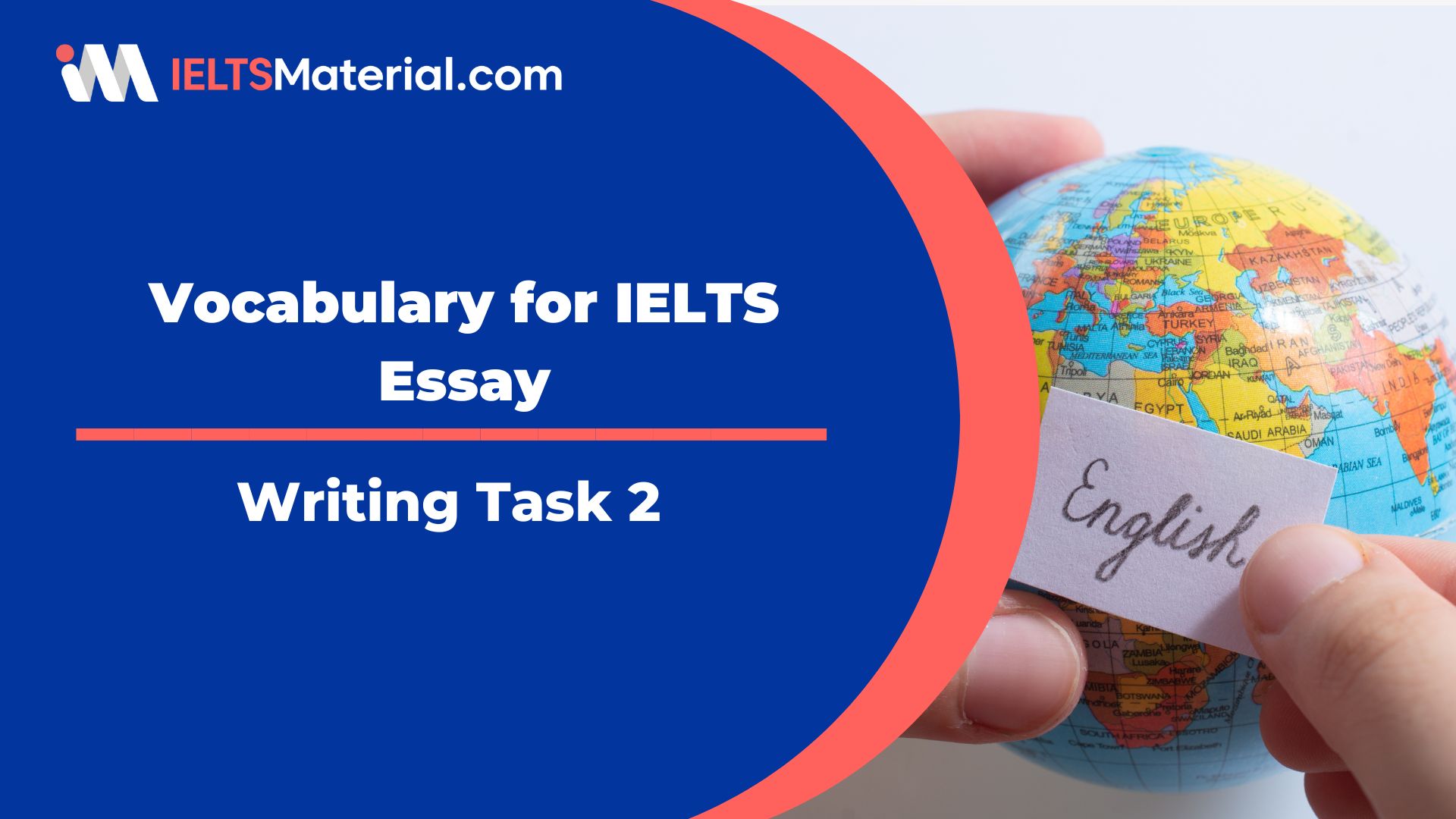Vocabulary for IELTS Essay (Writing Task 2)
4 min read
Updated On
-
Copy link
Table of Contents

Limited-Time Offer : Access a FREE 10-Day IELTS Study Plan!
Vocabulary enables every individual to express their thoughts and opinions. When a person learns a new language or takes a language proficiency examination like IELTS, it is essential to emphasize on it. Since vocabulary or lexical resource is an evaluation criterion for the writing module, in this article, we will focus on vocabulary for IELTS essay, which is the Task 2 for IELTS Writing.
General Structure of the Essay
In IELTS, the contribution of lexical resource or vocabulary in the Speaking and Writing modules is 25% each. But before we jump into the vocabulary for IELTS essay, let us revise the structure of the essay that the candidate has to write for Task 2.

-
Introduction
The introduction should contain a general statement about the subject, the paraphrased question statement, the thesis statement, and the essay’s outline.
-
Body Paragraphs
The body paragraphs are crucial, since this is where ideas or opinions are developed.
| Type of Essay | 1st Body Paragraph | 2nd Body Paragraph |
| Opinion | Detailed Discussion on the first point of agreement/disagreement | Detailed Discussion on second point of agreement/disagreement |
| Discussion | Discussion on one viewpoint | Discussion on the opposite viewpoint |
| Advantage & Disadvantage | Discussion on advantages | Discussion on disadvantages |
| Problem & Solution/Cause & Solution | Discussion on problem/cause | Discussion on solutions |
-
Conclusion
The points raised in the body paragraphs are summarized in the conclusion.
In order to understand the structure in a detailed way, check out the samples for each of the types given above.
Vocabulary for IELTS Essay
Now that the structure of the essay is clear, check some important vocabulary for IELTS essay that will enable the candidate to make the most of the 25% of the Lexical Resource criterion.
Connectors/Linking Words
Connectors or linking words are used in sentences to contrast ideas, add information, provide examples, summarise, and give an explanation. Other reasons why using connectors will help in increasing the writing score are:
- Highlight the test taker’s lexical capabilities and knowledge.
- Establish a connection between the parts of one or more sentences.
- Serve as a grammatical device to improve the coherence and fluency of written discourse.
- Make it easier for the reader to understand the meaning one is trying to convey.
So, here are some important connectors/linking words that candidates can use for the mentioned purpose:
For Expressing Opinion
- In my opinion…
- I strongly agree with the idea that/I strongly opine that…
- I’d like to point out that …
- I am convinced that …/I am certain that …
- As far as I’m concerned, …
- From my viewpoint,… / From my perspective …
- My own view on the matter is…
- It seems to me that…
- It appears that…
For Showing Contrast
- On the contrary …
- Alternatively…
- Nevertheless/Nonetheless …
- In spite of …/ In spite of the fact…/ Despite the fact …
- In contrast to this…
- Yet…
- Meanwhile…
For Outlining Facts
- The fact is that …
- It is obvious that …/It is clear that …
- There is no doubt that …
- This proves that …
For Providing Examples
- For example…/For instance
- …could be a good example here.
- As an example…
- To illustrate…
- With respect to…
For Conclusion
- To sum up…
- In short…
- In a word…
- To put it simply…
- That is to say…
- To repeat in short…
- To summarise…
For more such connectors/linking words with examples, click on this link.
Related Vocabulary to Increase your IELTS Band Score
Beside connectors, there are various other lexical resources that a candidate can use to enhance his/her writing skills for IELTS Writing Task 2.
Sometimes, students need a comprehensive activity-based workbook that can not only teach them new words but also ways to apply them in the right context. Keeping that in mind, IELTSMaterial has created a vocabulary workbook. This master book comprises topic-specific vocabulary, related exercises, a student space to make important notes or add words they have learnt from other sources, and many more.
Apart from the ones mentioned above, given below are some important resources that an aspirant can use while preparing for IELTS essays.
- Advanced Vocabulary – It is a word list (A-Z) comprising words, their meanings and their usage to help the candidate score a band score of 7.5 and above.
- Topic Specific Vocabulary – IELTS essays are generally based on broad topics which are commonly repeated, like environment, crime, government, etc. Test-takers can use these words or phrases while answering their Task 2 for IELTS.
- List of important collocations – A collocation is a grouping of two or more frequently occurring words. Native English speakers use these combinations as they simply sound “correct”. So, incorporating collocations in writing will definitely boost your writing score.
- Synonyms and Antonyms – Repetition of words is regarded as a faux pas in IELTS Writing (and Speaking as well). Therefore, learn synonyms and antonyms from various sources to avoid any kind of repetition and showing off your word power appropriately.
Conclusion
As vocabulary is vital for a good score in IELTS Writing and Speaking, candidates should take time to brush up their word power on a daily basis. Ways to do that is to prepare their own vocabulary list for each topic, go through various articles and fiction, follow various sources for word of the day, buy vocabulary specific books, etc.
Explore IELTS related articles

Start Preparing for IELTS: Get Your 10-Day Study Plan Today!
Recent Articles

Nehasri Ravishenbagam

Nehasri Ravishenbagam

Haniya Yashfeen





Post your Comments